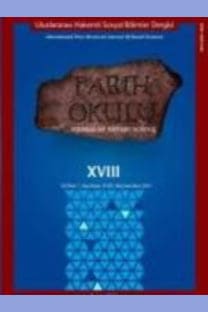TWEETING POLITICAL FEAR: TROLLS IN TURKEY
Korku, politik iktidarın kurulması ve sürdürülmesinde önemli bir enstrümandır. Türkiye'de Twitter trolleri genellikle #homoseksuellikyasaklansin, #kadinlarcalismasin, #kizlarokulagitmesin, #seriatgelsin, #oructutmayanlarsinirdisiedilsin gibi hastagler üreterek Türkiye'de egemen olan seküler korkuları aktive etmeyi hedeflerler. Bu hastagler, bu fikirlerin Twitter'da gündeme getirilip savunulmasından kaygıya kapılan insanların attığı eleştirel tweetler aracılığıyla kısa zamanda trending topic olur. Troller bir yandan korkuyu provoke ederken bir yandan da onu gülünçleştirir. Çalışmada, Türkiye'deki Twitter trolleri, korku ve iktidar bağlamında ele alınmıştır. Çalışma kapsamında, trollerle derinlemesine görüşmeler yapılmış ve öncelikle troll kimdir, neyi amaçlar ya da bir amacı var mıdır, trollüğün sınırları nelerdir ya da trollün sınırı olur mu gibi soruların yanıtları aranmıştır. Ardından, korku ve iktidar bağlamında, troll yeni bir politik dil üretebilir mi, eğer üretiyorsa bu yeni politik dilin imkânları ve problemleri nelerdir sorularının yanıtları üzerine bir tartışma yürütülmüştür
Korku Politikasi ve Türkiye’de Twitter Trolleri
Fear is an important instrument in establishing and sustaining political power. In Turkey, trolls generally make hashtags that provoke social fear of returning to the prerepublic religious and traditional values. For example, #homosexualityshouldbeprohibited, #womenshouldnotwork, #girlsshouldnotbeedu- cated, #theshariashouldbedeclared, #thosewhodonotfastshouldbe-deported. These hashtags become trending topics in a short period of time because they attract critical tweets in response to their controversial and provocative statements. On the one hand, trolls provoke social fears; on the other hand they ridicule those fears. In this study, trolls will be discussed within the framework of fear and politics. In depth interviews were conducted with trolls, looking to answer questions about who a troll is, what they do, if they have any intention or purpose, and what limits they may have, etc. The next part of the study looked at the question of whether a troll can create new political language, and if they can, what are the opportunities and problems with this new language within the context of fear and power
___
- Aktay Y (2010) Korku ve İktidar: Korku Üretimi ve Elit Tahakkümü, Pinar Yayınları, İstanbul
- Çetin H (2012) Korku Siyaseti ve Siyasetin Korkusu, İletişim Yayınları, İstanbul
- Dahlberg L (2001) Computer-Mediated Communication and the Public Sphere, http://jcmc.indiana.edu/vol7/issue1/dahlberg.html , erişim tarihi: 14.12.2012
- Donath S J (1999) Identity and Deception in the Virtual Community, Kollock P and Smith M (eds), Communities in Cyberspace, Routledge, London& New York, pp 27- 58.
- Herring S and Job-Sluder K and Scheckler R and Barab S (2002) Searching for Safety Online: Managing “Trolling” in a Feminist Forum, The Information Society, 18, 371-384.
- Philips W (2012) The House That Fox Built: Anonymous, Spectacle, and Cycles of Amplification, Television New Media, XX(X), 1-16.
- Philips W (2011a) LOLing at Tragedy: Facebook trolls, memorial pages and resistance to grief online, First Monday, 16 (12),
- http://firstmonday.org/htbin/cgiwrap/bin/ojs/index.php/fm/article/view/31 68/3115 , erişim tarihi: 14.12.2012.
- Philips W (2011b) Meet the trolls, Index on Censorship, 40, 68-76.
- Shachaf P and Hara N (2010) Beyond Vandalism: Wikipedia Trolls, Journal of Information Science, 36, 357-370.
- Swartz D (1997) Culture& Power: The Sociology of Pierre Bourdieu, The University of Chicago Press, Chicago
- Turner T and Smith M and Fisher D and Welser H (2005) Picturing Usenet: Mapping computer-mediated collective action, Journal of ComputerMediated Communication, 10(4), http://jcmc.indiana.edu /vol10/issue4/ turner. html ,erişim tarihi: 14.12.2012.
- Interview with @esatce (2012).
- Interview with @kurekli_batur (2012).
- Interview with @mefakest (2012).
- Interview with @muhmmdogan (2012).
- Interview with @olumvarhaci (2012).
- Interview with @panpichulo (2012).
- Interview with @sovergecerim (2012).
- Interview with @x (2012).
- ISSN: 1308-5298
- Başlangıç: 2008
- Yayıncı: Ahmet KARA
Sayıdaki Diğer Makaleler
HÜNKÂR İSKELESİ ANTLAŞMASINI HAZIRLAYAN KOŞULLAR
İKİNCİ DÜNYA SAVAŞI YILLARINDA MİLLİ KORUNMA KANUNU VE EGE KIRSALINDA ETKİLERİ
SON OSMANLI MEBUSAN MECLİSİ'NDE İZMİR VEKİLLERİ VE FAALİYETLERİ
1950 YILI SONRASI İSTANBUL'DA KONUT ALANLARININ OLUŞUMU VE SORUNLARI
BAZI HADİSLERDE DEĞİNİLEN CAHİLİYYE DEVRİ HAC UYGULAMALARI
OSMANLI DEVLETİ’NİN SON YILLARINDA DIŞ POLİTİKA MESELELERİ VIII: MASKAT1
AHMET REMZİ YÜREĞİR’İN HAYATI VE 8. YASAMA DÖNEMİ MECLİS FAALİYETLERİ
